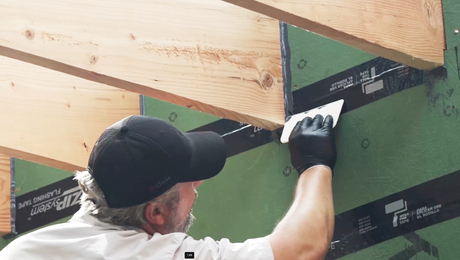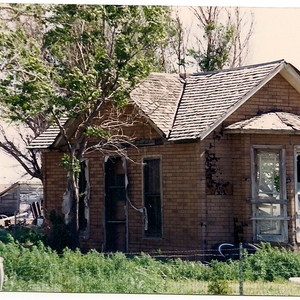New dream home has a lot of mold — Who to blame & how to correct it?
Howdy folks;
A co-worker had a home built over the last 8 months by a licensed GC. They moved in about 2 months ago, and this week finally investigated a persistent odor (which they had chalked up to new paint/carpet/materials). It turned out to be a lot of black mold. Every spot upstairs and down that they’ve pulled siding & cut into the sheathing as well as every patch of drywall they’ve cut out shows the mold – even in the attached garage.
The builder is trying to blame the insulation sub, as they used wet cellulose sprayed in the wall cavities. The insulation folks are willing to accept some blame, though point out they have mold inhibitors in the chemical mix of their insulation, and their insulation seems to have dried properly.
My co-worker says when she and her husband would visit the work site throughout the fairly wet winter we had (central illinois area in the US) stacks of studs and sheathing would rarely be covered regardless of the weather. She wondered if that contributed to the problem.
Anyhow, the builder isn’t talking until after the mold report comes back, and my friend is wondering ultimately what, if any, is the “best” way to actually fix the house. Is it legitimately fixable, or will it always be a potential troublespot (and require a reduction in the home value due to it)?
Thanks for your opinions and advice. Happy Independence Weekend to the former colonists. =)


















Replies
I think your friend should hire some sort of an expert to look at this, though I'm not sure what type of expert that would be. You need verifiable facts, not speculation. Or at least you need the opinion of a certified expert.
Among the possible causes:
the wet insulation
the wet materials
leaving the shell not "dried in" for an extended period (no shingles, no tarpaper or wrap on the walls)
leaks in the roof or walls
moisture rising up from the ground
water in the HVAC somehow -- eg, water in underground heat ducts or a humidifier on the furnace that's running amok
Certainly if your weather was close to ours it's been a wet spring, with high humidity even when it's not actually raining, and very little good "drying weather". I would guess that's a major contributor, but it's generally the contractor's job to mitigate such problems.
The current real estate disclosure laws being what they are in most states, your friend will have to disclose to any future buyer what happened, unless it's "completely" mitigated, at least. This will inevitably result in some loss of house value, but it's hard to say how much.
This can be typical with wet cellulose, particularly if the job moves along quickly after the insulation goes in. You have a wet mass of paper pulp trapped in wall cavities without enough circulation for the moisture to dissipate. Mold inhibitors aren't strong enough, plus you have the moisture migrating to the lumber. This moisture can also have an effect on plumbing and wiring in the walls, causing corrosion of metal. If a builder uses wet cellulose, heaters are run in the structure for several days and a moisture meter is used to assess when the insulation is dry enough to proceed with drywall installation. Skip the necessary drying time and you'll have the problems you are talking about. Great insulation, you just need extended construction time and lots of heat to allow it to dry correctly.
Since so much damage can occur, the fix may be removing all the drywall and insulation, cleaning up the framing, maybe replacing wiring, then starting over. Not an easy fix.
Regardless, the GC is the one who is responsible for all of the work. The homeowner shouldn't be tricked into the game of who is to blame - ultimately it is the GC. A certified mold abatement contractor should be able describe everything that needs to be done to make the house habitable. Either that or call Mike Holmes from HGTV. He seems to specialize in disasters like this.
Boomer's Law - If you can get your car into your garage you don't have enough tools.
Got any SOONER to go with that BOOMER?
Sooner?
Like as in Okies? From that small state next to Texas?
Thanks for the responses
You all make some valid points, and confirmed some fears and/or suspicions. I appreciate you taking the time. My co-worker has met with a lawyer to get some advice, though she's not looking to make it a legal issue until she knows what the GC is willing to do.
The mold toxicity report came back as negative, so at least they haven't been sucking down *bad* spores... =)
Toxicity report may be negative, but what as the insurance agent said?
Mold claims have had nothing to do with whether the mold is toxic or not (only a tiny amount of the molds out there are toxic), the touble being that residents can still sicken and take ill is the issue for insurers.
So, the homeowner's insurance company ought to be dealing with the GC, not the HO's. One of the things you "buy" with insurance is a pile of lawyers to chew on other people's lawyers. GC could be innocent here, but he's supposed to have insurance to protect his innocence as well.
Blame everyone from the GC to the subs to the architect to the real estate agent.
Sue everyone.
Let the courts figure it out.
I tend to agree w/ the other notes others have posted. Wet cellulose and unprotected materials are both issues. Covering wet cellulose prior to a drying period can be a problem. Do you have documentation on this time frame?
The GC is responsible. To cover materials. To ensure the house is ready for insulation (e.g. dried out), to time the drywall after the insulation is installed.
This is a huge issue and involves just about the most money anyone ever spends (on their house). Keep notes. Obtain documents. Seek expert help (only get the best, anyone less will get ripped to shreds in court). The expense will be well worth it to protect their interest in this situation.
This is significant. Your house or construction insurance may be involved. They maybe should defend your position. Do NOT make any more payments on this project until it gets resolved ... they probably already did.
Have your attorney apply gentle but firm pressure to ensure the contractor makes good. This is what contractors' liability insurance is all about ... to cover their mistakes either sloppy ones or innocent ones.
The GC is responsible for all under him. If you sue, you'll probably sue all who may have a hand in it.
They shouldn't take this lightly in any way shape or form! It's critical IMO that they bollster their position with the gathering of any and all relevant information. Best of luck.
Sounds like the same cnet IL contractor that fired Boss Hog after he told them they wuz doing stuff bad!
Don't forget ... also, that construction normally has a one year warranty standard, so sounds like the time is right for that, but shouldn't delay documenting the discovery of the issues.
Your hired the general contractor and he/she was responsible for the construction of your home. It could be that some of the subs were somewhat at fault. It could be that any number of details were incorrectly executed in the field. However, the GC, who hired his subs, has the most responsibility here. If it looks likes he/she is trying to put the blame on someone else without indicating that corrective measures will be used to come to a satisfactory conclusion for you, I would say start looking for an attorney.
Like I said, "Blame
Like I said, "Blame EVERYONE! Sue EVERYONE!" In utopia, it would be nice if you could always find the one responsible and hold them accountable. In the real world, the only concern is who has the money to pay. The only things you need to know are:
#1 Its not the Homeowners fault in any way shape or form
#2 It is someones fault other than God's
#3 Someone other than the Homeowner needs to pay.